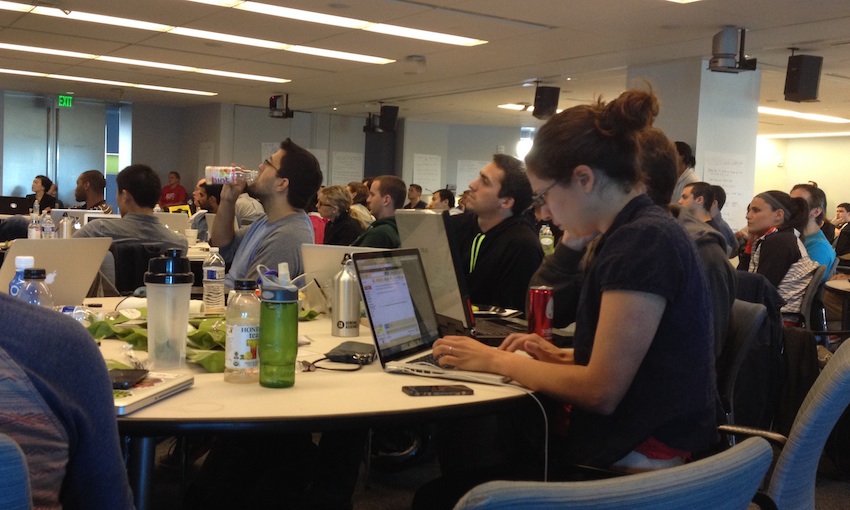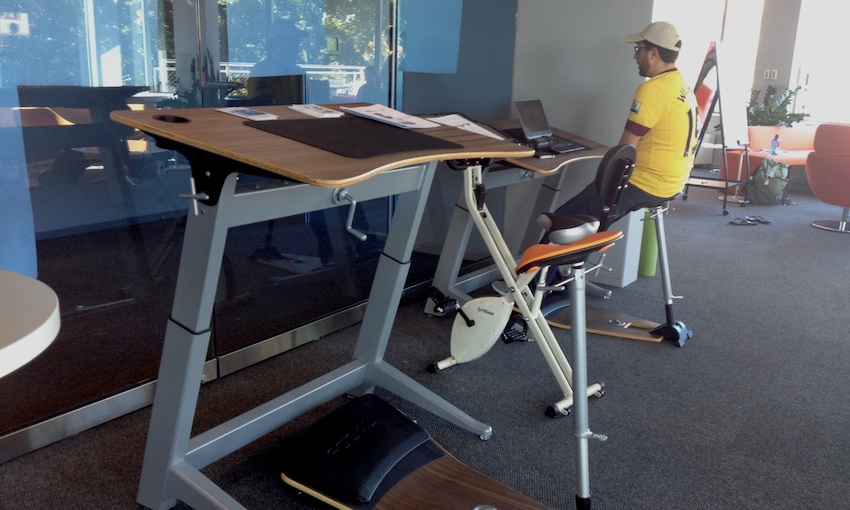Hack, Sweat, and Launch a Business at HackFit
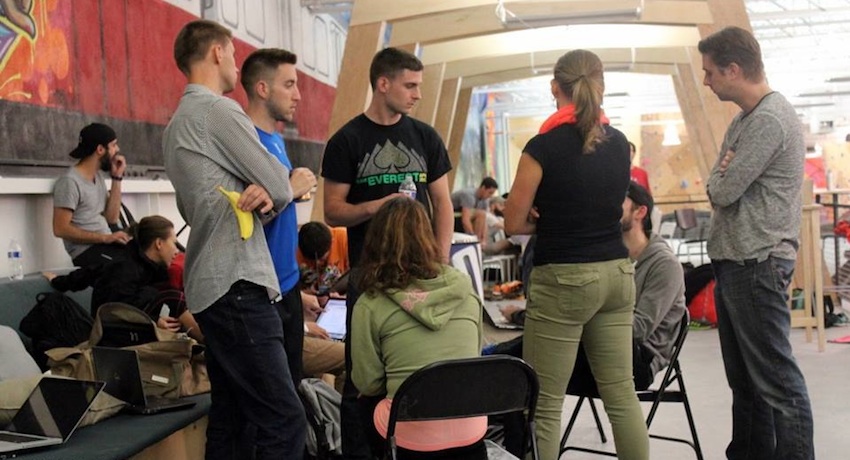
HackFitters take a break from climbing and begin work on their demos at Brooklyn Boulders on Saturday. Image via HackFit Facebook.
It’s the final day of HackFit, a hackathon in Cambridge, and the energy at the Microsoft N.E.R.D. Center is high. As teams anxiously wait to present their final pitches, one man drops to the floor to complete a series of pushups in the corner of the room. Then, another man begins to run laps. One team is meditating together in the corner, while a jittery man in a suit is pacing up and down the hall, repeating his pitch in a low whisper. He pauses every few seconds to wipe the sheen of sweat off his forehead.
One glance around the room makes it clear that this is not an ordinary hackathon. A hackathon, also known as a hack day, hackfest, or codefest, is an event that attracts computer programmers, software developers, and even businessmen. Hackathons have recently become something of a staple for technology startups, as the events allow people with big ideas to pair up with the technology wizards who can make those ideas happen. But HackFit is no ordinary hackathon.
HackFit’s founder, Justin Mendelson, is a tall, dark-haired, athletic-looking guy. He stands in front of his 20-odd teams on the final day of the hackathon in running shoes and Nike shorts. “There’s been a lot of sweating going on this weekend,” he says. “A lot of hacking going on, too. And hopefully, today we’ll see a lot of launching going on.”
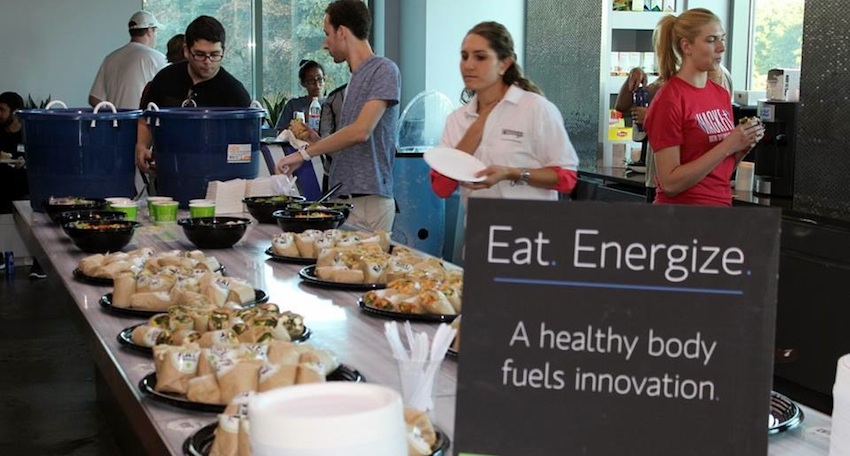
Healthy food was provided all weekend during the hackathon. Image via HackFit Facebook.
Mendelson conceived of HackFit with two goals in mind: to help launch health-oriented technology companies and to change the image of hackathons as unhealthy events. At his hackathon this weekend, which was the first in what he hopes will be a series of HackFit events, participants were required to sleep. They spent the second day of the hackathon working at Brooklyn Boulders, a climbing gym in Somerville, where they stopped working every few hours to climb, take CrossFit classes, practice yoga, and run along the Charles River. They also worked at treadmill desks and ate healthy food (like Sweetgreen) all weekend. The teams received points for each workout they did, and could also submit their points on Twitter. The team with the highest point value after a presentation to the judges, combined with their workout points, wins.
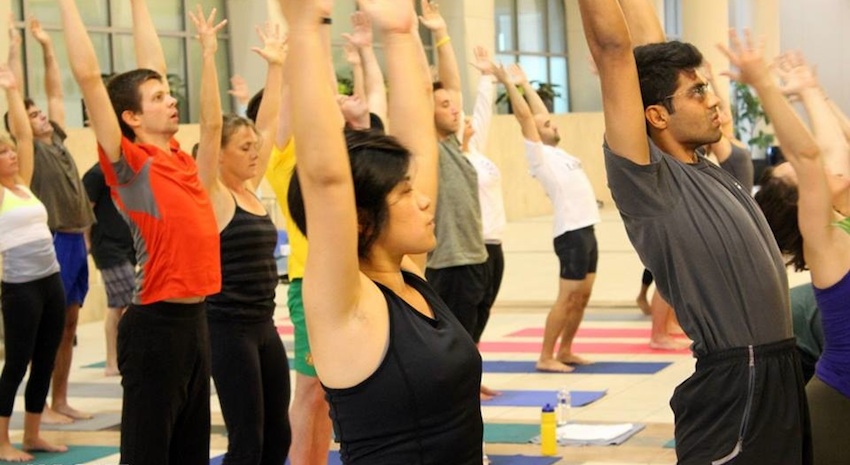
HackFit participants practice yoga on Sunday morning. Image via HackFit Facebook.
Before the weekend, the members of Team Crag Brag didn’t know each other. But despite having just met each other, they came together this weekend to develop an app called Crag Brag, which is a ranking system that allows climbers to “brag about their crags” and could be distributed at climbing gyms across the county. They hope that their shared passion for fitness and technology, combined with their innovative idea, will help them win HackFit. “The atmosphere here is intense,” says the groups only female member Galia Traub. “You workout hard, and intellectually it’s also been challenging. This exceeded my expectations.”
Tylor Hess, 25, a member of Team Crag Brag, thinks that the healthy components of HackFit made the weekend more productive for him. “When you get frustrated with your work, you can go climb and then come back to it after you’ve cleared your head,” he says. “It’s super helpful.”
Next to Team Crag Brag, Team Olympian Kitchen sits around a second table, looking relaxed and confident. Joey Orlando, 22, a cancer researcher and marathoner from Framingham, came up with the idea for Olympian Kitchen a few months ago, and he signed up for HackFit to see if he could make his idea into something tangible. Now he has a team of four guys and a demo of the app, which helps athletes determine what they should be eating after different kinds of workouts and gives recipes based on what ingredients you have in your refrigerator. “I’ve worked so hard this weekend,” Orlando says. “I biked to the rock gym, did CrossFit, worked on our demo. I feel so productive and exercise helps a lot.”
So for several hours on Sunday afternoon, more than 20 teams, including Crag Brag and Olympian Kitchen, presented to the judges in 3-minute pitches. There were apps for people who don’t know where to start with their workouts, video games designed to monitor heart rate and the amount of energy spent during a workout, programs to aggregate YouTube workout videos, and even apps that would allow you to bet with your friends on your workouts and win money. Eventually, Team SimplyLift, a weight lifting machine with sensors that transmit information about a lifter’s power output to an app, came out victorious.
“I went to bed last night and I was just mentally and physically exhausted in the best way,” says Traub. Although Team Crag Brag didn’t win, they say that they still feel incredibly positive about the HackFit experience. They hope to come back to the next HackFit event even stronger. “The intersection between fitness and technology is where we all want to be,” Hess says. “This has been an eye opening weekend.”
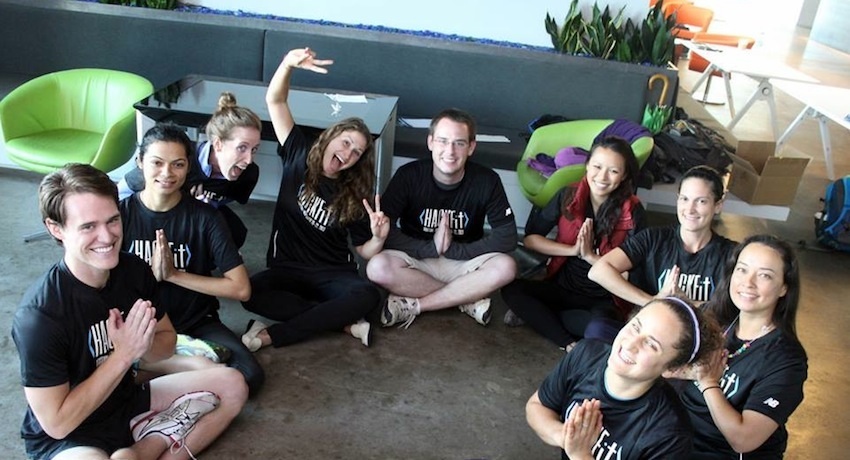
One team celebrates after the final pitch session. Image via HackFit Facebook.
